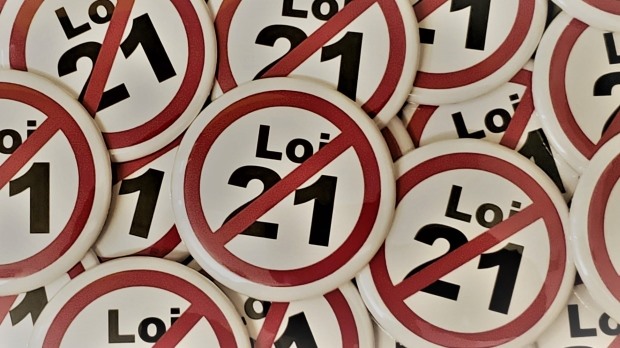On June 16, 2019, the Coalition Avenir Québec (CAQ) government implemented Bill 21, which banned public sector employees from wearing religious symbols at work. Since then, many McGill students and staff have critiqued the secularism the Act purports to uphold, drawing particular attention to its effect on racial and gender minorities. In their latest efforts to educate and mobilize others against the Act, the McGill Institute of Islamic Studies, the Students’ Society of McGill University (SSMU), McGill Coalition Against Bill 21, and the Muslim Students Association of McGill University (MSA McGill) hosted a joint panel on March 24 titled “Living with Law 21: Second-class citizenship in Quebec today.”
Weeam Ben Rejeb, 1L, one of the event organizers, explained to The McGill Tribune that the McGill Against Law 21 Coalition identified a critical need for public awareness while distributing “No to Law 21” buttons to the McGill community last fall.
“The majority of people that we spoke with had no idea that this law was in effect or what are the impacts and implications of the law,” Ben Rejeb said. “We wanted to organize this event to give a chance for folks interested in learning more to come and learn from our panellists, and to raise awareness. We wanted to provide a forum for learning and discussion where people can learn and also hear about practical ways that they can help in the fights against the law.”
The panel reflected an array of expertise and experiences, bringing together academic Zeinab Diab, lawyer Faiz Lalani, previous public sector employee Fatemeh Anvari, and community leader Rabbi Lisa Grushcow.
First to speak, Anvari recounted the events of Dec. 2021, when she was removed from her position as a third grade homeroom teacher at Chelsea Elementary School for wearing a hijab. Although she spoke from personal experience, she implored the audience to think of her story in the context of broader society, and consider their own positionality within it.
“If the experiences I shared of loneliness, pain, fear, sadness, and disappointment do not resonate with you in a similar sense or context, I invite you to look at whether this is due to a privilege,” Anvari said. “Now that this privilege exists for you, what do you choose to do with it? How do you choose to be, and how do you choose to exist, and co-exist?”
Next to speak was Rabbi Lisa Grushcow, BA ‘96, a senior Rabbi at Temple Emanu-El-Beth Sholom. Rabbi Grushcow acknowledged the importance of sharing experiences such as Anvari’s, echoing her belief that resistance to the law is and should be shaped by stories.
“It’s about us, as another religious minority, as people who often […] dress in a certain way as part of the practices of our faith,” Grushcow said. “It’s [also] very clearly a case of Islamophobia, of targeting Muslim women in particular.”
The panel’s two legal experts—Zeinab Diab, a Ph.D. candidate at the University of Montreal, and Faiz Lalani, BA ‘10, BCL/LLB ‘14 and partner at Davies Ward Phillips & Vineberg LLP—spoke about the technical dimensions of Bill 21, describing practical steps one can take to resist the bill.
“If you can, donate to the cause, write to the politicians, and participate in local politics, because that will have a tremendous impact,” Lalani said.
Rabbi Grushcow added that this panel was preaching to the choir. She urged attendees to open dialogue with people outside of the space in order to continue pushing for change.
“We need to be taking on this bigger societal project of getting in conversations with people with whom we disagree,” Grushcow said. “For us in this room who are advocates of diversity and pluralism, maybe it’s even more incumbent upon us to find ways to start those conversations.”








